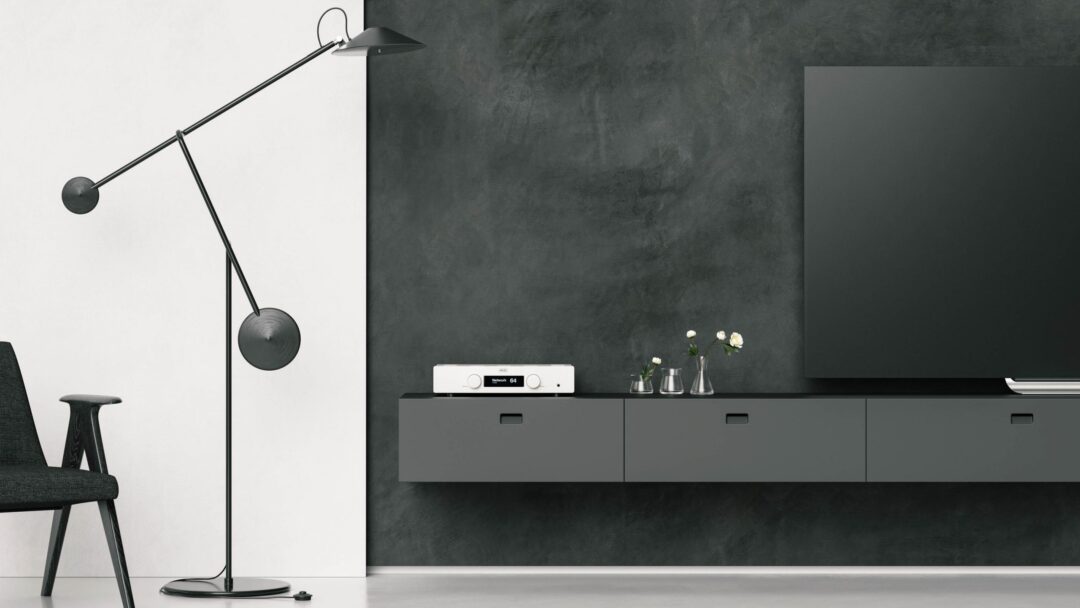Not only was the Röst Hegel’s first white amplifier and the first to be remotely controlled via the network, it was also the first integrated amplifier for under 2000 £ that had SoundEngine2. SoundEngine2 being the latest version of Hegel’s technology that significantly reduces music signal noise.
According to Hegel, you can think of SoundEngine as a kind of “noise cancelling headphones for the electrical signal” And there was no doubt that the Röst was a pretty exceptional amplifier, especially when you took its compact exterior into account. There’s room for it on any bookshelf or TV sideboard and it drives the speakers it needs to convincingly. Up to a certain point. If you want to play deafeningly loud music, the H190 is a better – but also more expensive – choice.
Röst was also Hegel’s first amplifier with a new and comfortable OLED display, instead of the small intense blue character display with line resolution.
With digital inputs, AirPlay and DLNA network playback, Röst was an amplifier for the masses. That is, both for those who wanted something simple, easy to use, and with a slender and neat form. But also for those consumers who were willing to pay a little more for better sound.

No complaints
I didn’t really have any complaints against the Röst, other than that the power output was halved compared to its predecessor’s 2 x 150 watts (H160). And that the bass sounded a little “dry”. But the Röst still sounded better in every way. The control over the bass was better and the soundscape hung more weightlessly in the air. At the cost of maximum sound pressure being 3 dB lower.
New features
Producing an “amplifier for the masses” brings with it certain obligations. These days it means the amplifier must take into account people at one end of the scale who want the option of Spotify Connect and also the connoisseurs who want Roon playback at the other end of the scale. The Röst did not satisfy these demands.

The new H120, on the other hand, has Spotify Connect, and we are promised a free Roon update in the near future, transforming the amplifier into a fully-fledged Roon endpoint over the network. In other words, you don’t have to use a USB cable between your PC and the H120, just connect it to the network with an Ethernet cable. Unfortunately, this update has been delayed and is not something I’ve tested. Instead, I have mostly used a USB connection from a PC with Roon as the player. The maximum signal processing rate is then 96 kHz.

Otherwise very similar
With the H120, Hegel have retained the output of the Röst and if you review the specifications on paper, the two actually look identical. Also appearance-wise, they are pretty indistinguishable. The exception is that the on/off switch is now slightly smaller and centred at the bottom of the front panel – while the switch on the Röst is located below the left side. A minor difference. When I view the two alongside each other, I can also see that the H120 (which we received in white) has a “whiter” white colour. “Our” version of the Röst, by comparison, has a slight yellow tint.
The power amplifier module is the same as in the Röst, but Hegel has installed a new and better DAC, and the pre-amplifier step has reportedly also been enhanced. However, the biggest differences are with the digital inputs.
Headphone output
The headphone jack has also been significantly upgraded. This sounds a lot better on H120 than on Röst. Better bass control, and less distortion when playing loud music. If you have a pair of proper headphones, the H120 will bring out the best in them.

Let the music flow!
Since most people will probably use the H120 to power a pair of proper speakers, I mostly focused on this.
My old faithful Audiovector R3 Arreté got to try it first. From This Place from Pat Metheny’s latest album of the same name is a quiet jazz ballad with a great string intro, delicious acoustic guitar and with the voice of Meshell Ndegeocello in the middle of it all. Played via Tidal in Roon (96 kHz MQA, software-decoded), the sound through the Hegel H120 is beautifully airy and the strings waft through the air with an ethereal quality, just as they should. The vocals of Meshell are perfectly nuanced, and although the double bass is not the instrument with the greatest focus here, it is key in emphasizing the foundation and giving the soundscape a solid base. The H120 manages this in impressive fashion, and sounds like a much larger amplifier.

It’s not as easy to hear the improvement from the Röst to the H120 as it was to hear the improvement from H160 to Röst. Because when I play through the Röst, it has a lot of the same things to offer. But the sound is not quite as dissolved and ethereal with the Röst.
Rap
When you start to crank up the sound with Eminem’s Without Me, it becomes clear that even though the H120 can’t play any louder, the bass sounds more muscular. The control is probably much the same, but with better resolution in the bass you get more focus on the sharp starts and stops in the rhythm section.
Returning to Pat Metheny, I can now also hear that the sound of the double bass is a little less transparent and “analog” with the Röst. We’re talking nuances here, and if you have a Röst from before, I wouldn’t even think about it. But, yes, you do get something extra with the H120.
Billie Eilish’s gorgeous James Bond ballad No Time To Die is powerful; her voice through the Hegel and Audiovector quivers in your spinal cord.
Electrostatic speakers
When I switch over to a new speaker pair, namely the electrostatic Martin Logan ElectroMotion ESL X, things happen. Since the panels play both midrange and treble, there is absolutely seamless coherence in the brightest frequency ranges. The bass is a little more limp than with Audiovector, and the speakers are a tougher challenge. They drop down to 1.6 ohms at 20 kHz, which should mean that different amplifiers will have different rendering of the overtone area with these speakers.
Both the Röst and the H120 highlight the very rapid response of electrostatic speakers. H120 is more fine-meshed and the voice of Aurora on Walking in the Air is better defined and reaches further into the room. It’s interesting to note that the speakers are nowhere near the resolution of the more traditional ones from Audiovector, and since I think the R3 Arreté ones bring out the differences as well as the ESL X, I go back to them.
Competitors
When talking about compact amplifiers in this price range, the Naim Uniti Atom is an obvious competitor. It’s not as neutral as the Hegel, but sounds more engaging than Röst at low sound levels. Because the Röst can sound a little “dry”, where the Atom has a livelier bass. The H120 has more of the engaging bass, and when you push up the sound level, the Atom starts to get breathless sooner. So H120 is a more complete amplifier than both the Atom and Röst, ignoring the fact that the streaming part of the Atom is in another league.
We also include the NAD M10, which has 100 watts and also fully-fledged MQA decoding. The 100 watts in Class D don’t provide very much extra headroom, but it also sounds good. And if you have a less than optimal listening room, the built-in Dirac Live room correction can work wonders with the sound quality of your room. Which gives the Hegel H120 some real competition right there.
Its own biggest competitor
But the biggest competitor to the H120 is none of the aforementioned. Instead, it comes from Hegel themselves. If you increase your budget by just 500 pounds you can get the even better H190. It has gone down in price since HiFi Klubben assumed control of the agency and it does everything the H120 can, only better. Double the power output, even heftier bass and better sound. If you’re going to go for H120 over H190, it must be because you’ve fallen for the compact exterior and think the H190 is somewhat outsized. Because it’s so much better that I’d never hesitate to cough up the extra 500 pounds.
Conclusion
Hegel has produced an improved successor to the compact Röst, an amplifier slender and low enough to fit on to virtually any bookshelf. But neither Röst nor its successor, the H120, are lightweights; here, most of the speakers are powered convincingly, despite the output being on the wrong side of 100 watts.
When you’re done being impressed by the tight bass control and the resolution of the bass tones, you can start enjoying the large, airy soundscape of the H120. The audio quality is not exactly a quantum leap above the Röst, but undoubtedly better. What is also new is support for Spotify Connect and soon it will be Roon Ready.
Despite some competitors in their own price range, perhaps it will be Hegel themselves who will steal the largest market share from the H120. Because for just 5,000 NOK more you can get the H190, which is even better. However, if there’s a shortage of space and you want the tight bass control that Hegel is known for, the H120 is a great choice.

We think
The compact and neat exterior contrasts with the enormous soundscape, with tight control over the bass drivers. Combined with very fine-meshed overtones and all the digital inputs you could ever need. For some speakers – and listeners – 2 x 75 watts can seem a bit slight. In addition, the price upgrade to the even better H190 is barely noticeable.
2395 €
Specifications
- Output power: 2x 75 W in 8 Ohms
- Damping factor: More than 2000
- Inputs: 3 optical, coaxial, USB, network, XLR, 2 RCA
- Signal processing USB: 96 kHz
- Network: AirPlay, Spotify Connect, IP control, Roon Ready (future update)
- Line output: Variable RCA
- Dimensions: 10 x 43 x 31 cm (H x W x D)
- Weight: 12 kg
- Version: black or white

